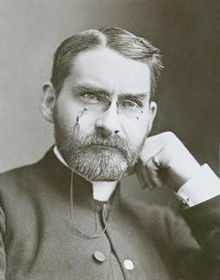Hugh Price Hughes


Hugh Price Hughes (9 February 1847 – 17 November 1902), was a Welsh Christian theologian in the Methodist tradition. He was the founder of the Methodist Times and the first superintendent of the West London Methodist Mission, a key Methodist organisation today. He was a driver of social change and reform.
Biography
Hughes was born in Carmarthen, and was educated at University College London and the Wesleyan Theological College at Richmond. He married Katherine Hughes, who represented Sisters of the People. In 1885, he founded the Methodist Times, and in 1887 he was appointed Superintendent of the West London Methodist Mission. In 1896, he was elected first president of the National Free Church Council. He died in London.[1][2]
Associated Activists in Social Change
- Emmeline Pethick-Lawrence
- Mark Guy Pearse
- John Greener Hallimond according to "A Countess at the Bowery Mission," The Christian Herald And Signs Of Our Times,
20 December 1899, page 987: "Nine years ago, he [Hallimond] was connected with the great West London Mission, England, of which Rev. Hugh Price Hughes is Superintendent." This is repeated in "Great Heart of the Bowery: Leaves from the Life-Story of John G. Hallimond,late Superintendent of the Bowery Mission," Fleming H. Revell, NY: 1925. In the biographical forward by George H. Sandison of Christian Herald "Nine years before he came to America he was connected with the great West London Mission, of which Rev. Hugh Price Hughes was Superintendent" (page 13).
He was a strong supporter of Gladstone's Irish Home Rule Bills. After Charles Stewart Parnell was revealed to have committed adultery with Katherine O'Shea Hughes declared that if Irish nationalists retained a proven adulterer as their leader they would have shown themselves unfit for self-government. This threat to withdraw Nonconformist support from the Liberal Party led Gladstone to state that he could not remain as Liberal leader if Parnell continued to lead the Nationalists, thus precipitating the Parnell Split.
References
- ↑ The history of the West London Mission
- ↑ History. wlm.org.uk
|